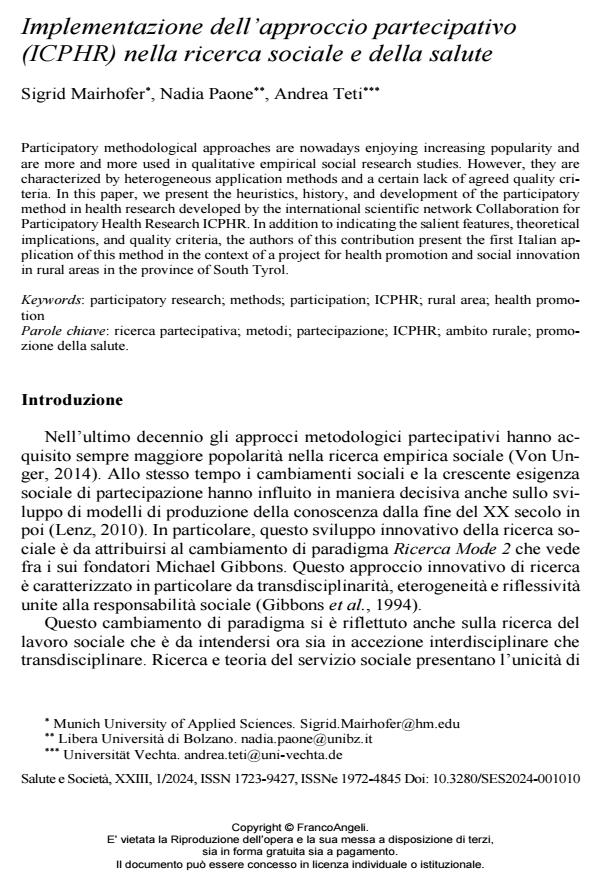Implementazione dell’approccio partecipativo (ICPHR) nella ricerca sociale e della salute
Titolo Rivista SALUTE E SOCIETÀ
Autori/Curatori Sigrid Mairhofer, Nadia Paone, Andrea Teti
Anno di pubblicazione 2024 Fascicolo 2024/1
Lingua Italiano Numero pagine 14 P. 156-149 Dimensione file 370 KB
DOI 10.3280/SES2024-001010
Il DOI è il codice a barre della proprietà intellettuale: per saperne di più
clicca qui
Qui sotto puoi vedere in anteprima la prima pagina di questo articolo.
Se questo articolo ti interessa, lo puoi acquistare (e scaricare in formato pdf) seguendo le facili indicazioni per acquistare il download credit. Acquista Download Credits per scaricare questo Articolo in formato PDF

FrancoAngeli è membro della Publishers International Linking Association, Inc (PILA), associazione indipendente e non profit per facilitare (attraverso i servizi tecnologici implementati da CrossRef.org) l’accesso degli studiosi ai contenuti digitali nelle pubblicazioni professionali e scientifiche.
Participatory methodological approaches are nowadays enjoying increasing popularity and are more and more used in qualitative empirical social research studies. However, they are characterized by heterogeneous application methods and a certain lack of agreed quality criteria. In this paper, we present the heuristics, history, and development of the participatory method in health research developed by the international scientific network Collaboration for Participatory Health Research ICPHR. In addition to indicating the salient features, theoretical implications, and quality criteria, the authors of this contribution present the first Italian application of this method in the context of a project for health promotion and social innovation in rural areas in the province of South Tyrol.
Parole chiave:ricerca partecipativa; metodi; partecipazione; ICPHR; ambito rurale; promozione della salute.
- Condizioni di vita e invecchiamento: un'indagine descrittiva del contesto biellese Marina Di Giacomo, in SALUTE E SOCIETÀ 1/2025 pp.18
DOI: 10.3280/SES2025-001003
Sigrid Mairhofer, Nadia Paone, Andrea Teti, Implementazione dell’approccio partecipativo (ICPHR) nella ricerca sociale e della salute in "SALUTE E SOCIETÀ" 1/2024, pp 156-149, DOI: 10.3280/SES2024-001010